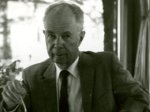
Two more coincidences brought me my last academic jobs. During a philosophical conference at Kent State University I read a paper On Kant's Contribution to Metaphysics. By happenstance the philosophy chairman of Hiram College, not far from Kent, heard the paper and that led to my visiting professorship at Hiram, 1963-65. In the winter of 1963 I was at a big conference in Boston and happened to sit down beside a man who turned out to be Dean Runkle of Southern Illinois University which was about to open a new campus in Edwardsville. Runkle told me about a course to be offered, Art in Seven Cities. It sounded interesting. When Runkle heard that I had taught courses in the history of art since 1932 he asked whether I could and would teach such a course, and that led to my last appointment in 1965, as a visiting professor of philosophy at Edwardsville. After fifty years of teaching I retired in 1973.
Let the reader choose whichever of the two words I used in the title of this account. As for myself, Happenstance explains nothing, and Providence sounds too conceited. "Lord, what is man that thou takest knowledge of him, or the son of man that thou makest account of him?" (Psalm 144:3. Compare Job 7:17.) Yet this very question expresses conceit, the conceit which would ignore the reminder of Augustine that God "does not enjoy us but makes use of us; for if he were neither to enjoy nor to use us, I do not see how he could love us." (De doctrina Christiana I, xxxi, 34. Compare Psalm 8:6.)


